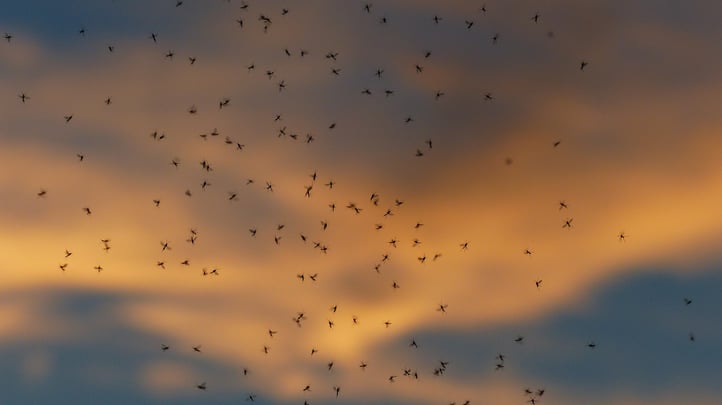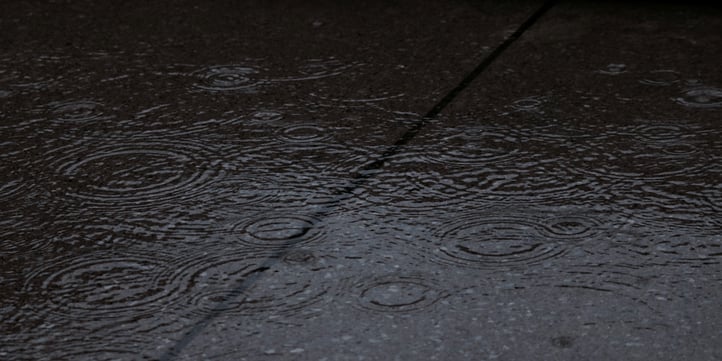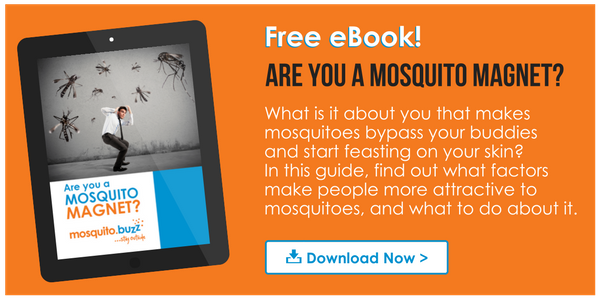
Weather is a major motivator for what mosquitoes do, and when.
Mosquitoes are cold-blooded insects. This means that their body temperature is more or less the same as their environment, since they don't have the ability to regulate their internal temperatures.
Considering how driven by temperature mosquitoes are, it's no wonder weather plays such a make-or-break role in mosquito activity.
Rainfall = Mosquito Breeding
A wet Spring often means we're in for a rough Summer full of mosquito bites. The reason is simple; mosquitoes lay their eggs in standing water.
Flooding rains create ideal breeding conditions for mosquitoes. More rain means more potential for puddles, and more potential for mosquito breeding.
Significant rainfall will likely mean an outbreak in mosquito activity, especially if puddles have been left alone for baby mosquitoes to hatch in. Frequent rain can wash out the eggs that have been laid, but mosquitoes are smarter than we give them credit for. The clever ones will lay their eggs in places like tires, which collect water while providing a bit of insulation.
Considering how common it is for mosquito populations to increase after a storm, it's important that water isn't left to stagnate. All a female mosquito needs is an inch of water to lay batches of 100 to 200 eggs. Once she has laid her eggs, they hatch into larvae within 24 to 48 hours.

Summer = Mosquito Biting
It's well known that mosquitoes love warm climates. Mosquitoes are active once temperatures are consistently above 10 degrees, but activity tends to jump when it's 26 degrees and up.
Different species are active at different times, but in general, most mosquitoes are extra active at dusk and dawn. Warm evening temperatures allow mosquitoes to thrive, since prolonged sun exposure can actually dehydrate them.
Warm weather also means a greater chance of infection. Research has shown that for mosquitoes carrying West Nile virus, the virus can be amplified in warmer weather. Same goes for Zika mosquitoes; the warmer it gets, the more efficiently they transmit the virus.
That's because warmer air incubates viruses faster in mosquitoes, which gives them more time to spread them. Combine that with the fact that warmer temperatures make them hungrier for blood meals, and you've got a recipe for a potential outbreak.
It can, however, get too hot and dry for mosquitoes. In some areas that are too hot, mosquitoes will be less active. Unfortunately, mosquitoes are used to much more intense heat than we get here in Canada.
.png?width=722&height=361&name=swat%20(twitter).png)
Winter = Mosquito Disappearance
Since mosquitoes are cold-blooded, they basically shut down when temperatures are less than 10 degrees. Although it might seem like they've all disappeared, they do have strategies to survive cold weather.
Many mosquitoes go dormant in Winter and hibernate, finding holes to wait in for warmer weather. Other species, however, can't survive the harsh Canadian climate.
Some female mosquitoes lay their eggs in water in the Fall, which lie dormant and eventually freeze. The frozen larvae keep until the weather warms up... at which point they hatch and wreak havoc all over again.
.png?width=722&height=361&name=bestthingsaboutwinter%20(twitter).png)
Disclaimer: We know they don't actually die and burn in hell, but they do disappear and thats all we care about :)
Depending on where you are in Canada and how much rainfall you've had, you might be gearing up to spray a tonne of repellent on your skin.
To help control the mosquito populations around your property, make sure you regularly drain or get rid of any standing water. You can also trim grass and vegetation to give them less places to hide in.
For a fool-proof way to prevent mosquitoes, talk to our team of mosquito control experts. We can visit your property every 21 days, providing full barrier protection throughout your property.
Follow us on Facebook for weekly tips and tricks on managing mosquitoes and ticks.



